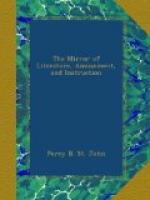A tanner, named Rapedius, of Bern Castel, on the Moselle, has discovered a new species of tan proper for dressing leather. It is the plant known by the name of Bilberry or Whortleberry, (Vaccinium Myrtilus or Myrtillis,) which should be gathered in spring, because at this season it dries more readily, and is more easily ground. Three pounds and a half of this tan suffice for dressing a pound of leather, while six pounds are required from the oak to produce the same effect. By this new process, tanners can gain four months out of the time required for preparing strong leather. A commission having been appointed at Treves to examine the leather so prepared, reported, that they had never seen any as good, and that every pair of shoes made therefrom lasts two months more than what are manufactured from common leather; that the skin of the neck, which it is difficult to work, becomes strong and elastic like that of the other parts. The shrub should not be pulled up, but cut with a bill, to obtain the reproduction of the plant the following year. When cut, damp does not deteriorate it, which is not the case with oak bark, which loses ten per cent. of its value by being wetted.—From the French.
Spiders.
It would be very interesting to know whether the gossamer threads thrown out by these insects are in an excited state of electricity: their divergent state would seem to imply they were; for there seems to be no other natural cause which could prevent them from coming together, especially before the insect had left its resting-place. If electric, then neighbouring bodies, as the hand or branches of a tree, or a stick, &c., would attract them; but care would be required in making the experiment, from the readiness with which these threads would move upon disturbance of the air. If electric, then it would be important to know whether they were positive or negative; which their attraction, or repulsion, by a stick of sealing-wax, rubbed on the sleeve of a coat, would at once determine. It is well known that these threads are almost perfect insulators of electricity, and would retain a charged state for a long time in a dry sunny atmosphere.—Brande’s Journal.
Method of obtaining Roses of all kinds twice in the Year.
The following directions, by M. Douette Richardot, are to enable the amateur to gather as fine roses in September as he did in the preceding June:—1. Immediately after the first flowering, the shrub is to be deprived of every leaf, and those branches which have borne roses cut so that only two or three buds shall remain. The cutting of the weaker branches may be in a less degree. If the weather be dry when the leaves are removed, it will be necessary to thoroughly water the stem, for several days, with the rose of the watering-pot: in this way the sap will not be arrested. 2. Then the brush is to be used, and the rose tree well cleansed by it, so that all mouldiness shall disappear: this operation




